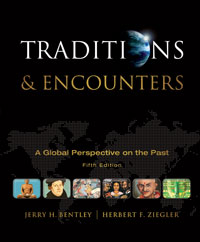
Traditions and Encounters, AP Edition (Bentley), 5th EditionChapter 18: States and Societies of Sub-Saharan AfricaOverviewAgriculture and herding spread gradually throughout sub-Saharan Africa from about 2000 B.C.E. until the end of the first millennium C.E. through a process known as the Bantu migrations. After about 500 B.C.E. the knowledge of iron metallurgy was also disseminating throughout Africa. As a result of these movements, of the introduction of new nutritious foods such as bananas, and of long-distance trade, the population of Africa grew dramatically, and increasingly complex forms of government began to emerge. Most sub-Saharan African cultures were kin-based and organized into relatively small villages that were loosely allied into districts governed by a chief. Occasionally larger and more structured kingdoms and empires appeared. These larger states generally consolidated their position through controlling long-distance trade in their regions. In general, the history of sub-Saharan Africa from 1000 to 1500 C.E. is noted for the following:
|  |















